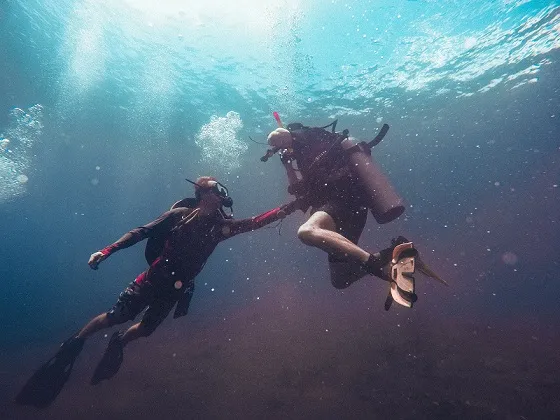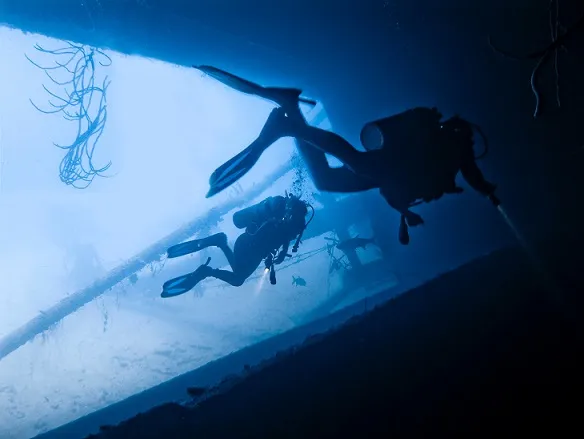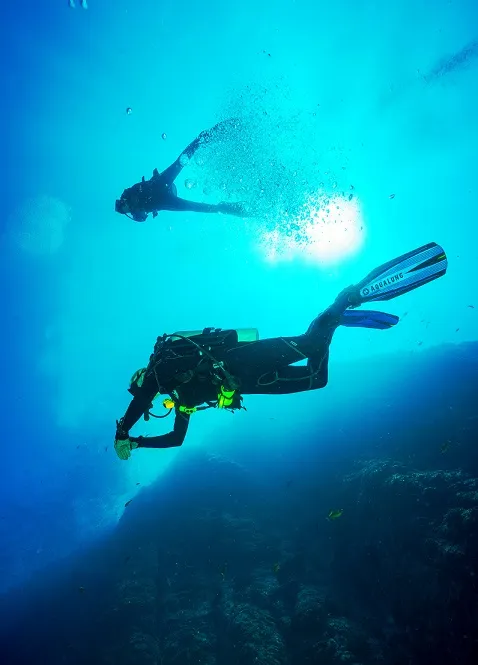So my dream was coming to life, I was now a full-fledged certified Divemaster. This qualification entitles me to be employed anywhere in the world. I am now permitted to guide divers and also perform low level training. There are lots of opportunities for employment in exotic locations around the world. Now time to make a choice of where to do it.

Photo by Nik MacMillan on Unsplash
Here is how the process worked for me and in my experience will work for most anyone. Unless you are really terrible at it (in which case you should seriously contemplate why it is you passed in the first place) the dive center that issued you the Divemaster certification in the first place will likely offer to take you on board as a staff member. If they don't at LEAST offer to take you on as a freelance worker (part-time, on-demand staff) then they likely believe you are not a knowledgeable and a danger to other divers. I have only ever heard of this situation existing locally once, and I think it is pretty horrible that they would certify this person at all because to grant someone the title of diveMASTER when they aren't good at it, denigrates the title.
I was hired by the company that trained me and it is a very common process. The idea behind this should be pretty self-evident: You are already familiar with how the company operates, you have been kind of working with them for the past couple of months during your training, you already know the other staff members, and they understand your strengths and weaknesses. The biggest plus for the company that is hiring you is that you are likely already familiar with the dive sites that their company frequents. It doesn't matter how talented you are as a diver, if you have never been to a dive site before, how can you possibly guide others on that dive?

Photo by Vlad Tchompalov on Unsplash
I was not nervous about guiding people on my own. I had a great teacher and i simply emulated his guide style anytime I had divers. I was a bit apprehensive about straying from the path and for the most part ensured that I always had another, more experienced guide in my sight, which can be difficult if your customers stop to take photos (and they do - it used to be rare to have a dive camera but now EVERYONE has one.)
One particularly bad day I had a few German customers with kind of limited English-speaking capabilities (I don't speak any German) and they were really going slow. Ultimately it is kind of up to the customers how fast we move, and I soon lost all visual contact with the other dive teams. I am the first to admit that my underwater navigation is probably the weakest part of my dive skills and at the end of an hour we ended up surfacing several hundred meters from the dive boat. The crew were not happy with me as moving a boat to pick up customers far from the boat is dangerous because propellers can rip you to ribbons. They had to pull us in using safety rings on a rope and it looked very unprofessional for me.
They took it easy on me because I was new, but I took this reprimand very seriously and rather than just belittle me, the other more experienced instructors worked with me on my navigation skills before the next dive and also worked as a team to keep an eye on me until I got my skills "up to scratch." This reassured me that I had chosen the correct dive center to work with: They understand that it is unreasonable to expect you to be an expert at everything and work together to help you for the sake of the team.
Your major job as a dive guide is to ensure the safety of the guests and everyone agreed I was just as good at that as the more experienced staff members.
Downside of being the FNG
FNG stands for F$*king New Guy, by the way. As the FNG you will always get the least desirable jobs. This normally incorporates being a guide for snorkelers who aren't even going diving - they combine the two groups on the boat in order to try to make as much money as possible as the dive industry, particularly here in Krabi, is extremely competitive.
About 50% of the time, i wasn't even putting on dive gear, which was disappointing. The even more frustrating thing about this situation is a lot of the time these customers were non-English speakers and often times couldn't even swim. So there they are flailing about in the water with a life-jacket on, and me next to them pulling them around to all the things they can see. It is exhausting even when it is 110 lb. Japanese ladies.
You also are very very unlikely to ever receive the most coveted prize in dive guiding: Canadian or American divers. This demographic is EXTREMELY likely to tip at the end of the day. Therefore the more senior guides and instructors almost always take these people for themselves. Don't get upset. As the FNG you have to earn this privilege.
You start every day at 7, you end every day at five. However, unlike the horrible "office-space" type job I had before, I didn't hate my alarm clock, I was excited about going to work and so were the other dive professionals that I worked with every day. I was only making about $30 a day, but instead of reporting to a cubicle, this became my office.

I think this is a great way to make a living :)